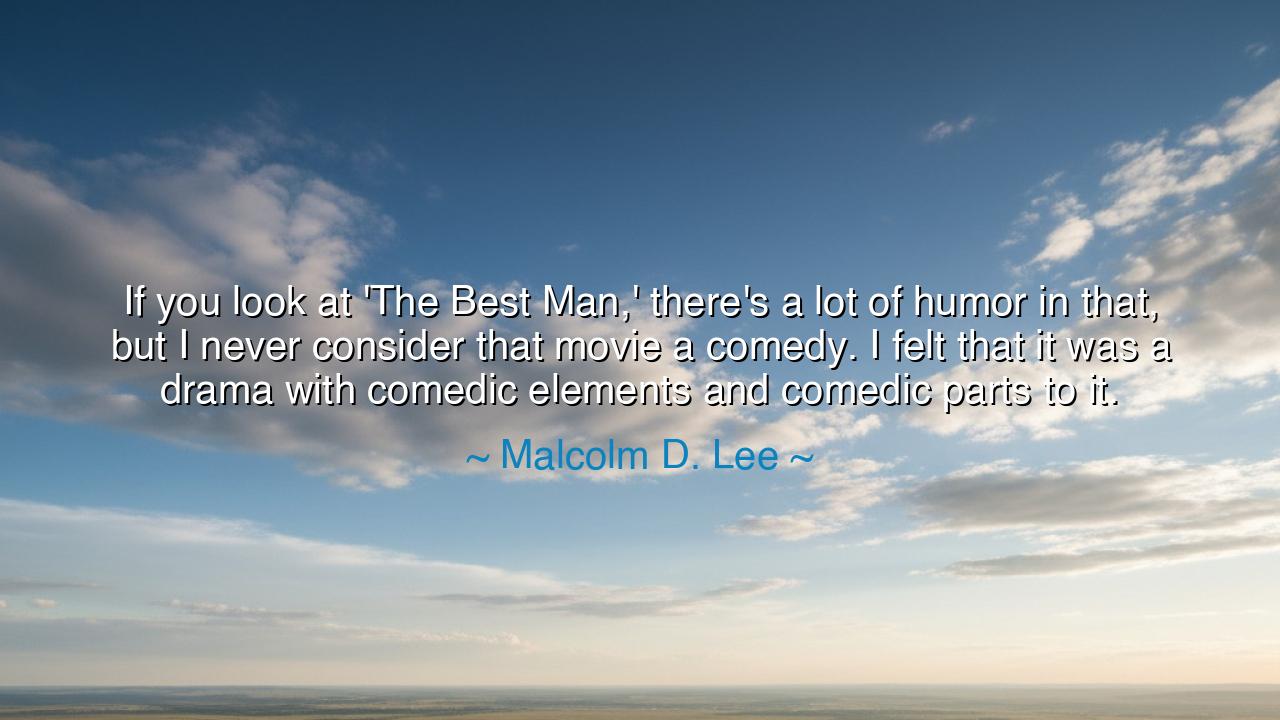
If you look at 'The Best Man,' there's a lot of humor in that
If you look at 'The Best Man,' there's a lot of humor in that, but I never consider that movie a comedy. I felt that it was a drama with comedic elements and comedic parts to it.






When Malcolm D. Lee declared, “If you look at ‘The Best Man,’ there’s a lot of humor in that, but I never consider that movie a comedy. I felt that it was a drama with comedic elements and comedic parts to it,” he spoke not only as a filmmaker but as a philosopher of the human spirit. In those words lies an eternal truth: life is a drama woven with laughter, and laughter is the echo of our endurance. For what is existence if not the ceaseless interplay between joy and sorrow, between the lightness of jest and the heaviness of truth? Lee’s insight lifts us beyond the shallow divisions of genre and into the realm of essence—into the understanding that art, like life, cannot be confined to one tone.
To call The Best Man a drama with comedic elements is to recognize that humor is not merely an ornament upon the story but a vital current of humanity flowing through it. Laughter, in Lee’s vision, is not an escape from pain—it is a way of bearing it. His film captures that sacred paradox: that even in the midst of betrayal, love, loss, and reconciliation, the soul finds moments to smile. It is through such laughter that people remain whole, even when life shatters around them. Thus, the film becomes not a comedy, but a reflection of the truthful rhythm of existence, where mirth and grief share the same breath.
In the ancient days, the dramatists of Greece knew this wisdom well. Consider Euripides, who wrote of kings and heroes undone by fate, yet sprinkled within his tragedies flashes of humor—small, human moments where gods mocked men and men mocked themselves. The laughter that rose from those moments was not mockery; it was recognition. It reminded the audience that even in despair, one could still find the courage to smile. This blending of tones—the tragic and the comic—was seen not as confusion, but as completeness. The wise understood that to capture life, one must portray both its storm and its sunlight.
The same truth lived in the works of Shakespeare, who followed in the footsteps of the ancients. In Hamlet, the gravedigger jokes while holding the skull of the dead. In Macbeth, the porter mocks fate just as blood stains the kingdom. These were not contradictions—they were the pulse of life itself. For laughter and tears spring from the same well: the deep awareness of being alive. So too does Lee’s film, though made in modern times, carry that timeless current. Beneath the suits, songs, and smiles lies the old truth—that joy and sorrow are kin, and that one cannot live without the other.
There is a story told of Abraham Lincoln, who, during the Civil War, was known to tell jokes at the height of national tragedy. His advisors sometimes rebuked him, saying that humor was unbecoming of a leader in dark times. Yet Lincoln replied, “If I did not laugh, I should die.” In that moment, he revealed the sacred function of humor—it is not denial, but defiance. It is the human soul saying to suffering, You will not have the last word. Malcolm D. Lee’s philosophy mirrors this: the laughter in The Best Man is the laughter of endurance, the laughter that survives heartbreak and finds strength in it.
Thus, the quote teaches that the greatest stories—and the greatest lives—are not one-note symphonies. They are complex, layered, and full of contradiction. They do not fear to blend laughter with pain, or tenderness with struggle. This is how truth is revealed—not through perfection, but through balance. When Lee says his film is “a drama with comedic parts,” he speaks as a sage might say that life is a test with moments of grace, a journey that asks us to feel everything, and to find beauty in the full range of experience.
And so, my listener, take this lesson as your own. Do not flee from pain, nor cling too tightly to joy. Let both teach you. When you weep, do not forget to laugh; when you laugh, remember the tears that taught you gratitude. When you tell your own story—through words, through work, through living—let it carry both depth and lightness. For a life that knows only laughter is shallow, but a life that forgets laughter is unbearable.
To live wisely is to live as Lee creates: with heart open to both comedy and drama, to both triumph and sorrow. Build your days like a story that holds every tone of the human song. For in the end, it is not whether life makes us laugh or cry that defines us—but whether we had the courage to feel it all, and to keep walking forward beneath the changing skies of our own story.






AAdministratorAdministrator
Welcome, honored guests. Please leave a comment, we will respond soon